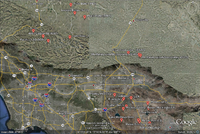CyberShake PBR Study
From SCECpedia
This CyberShake Precarious Balanced Rock Study will evaluate whether CyberShake ground motions are likely to knock over known Precarious Rocks. Here we define the processing inputs and outputs for this study.
Program inputs:
The user configurable parameters that should be input to our rotation program include:
- CyberShake_Study_ID: 35 #CyberShake 1.0 = 35, CyberShake 2.2 = 40
- CyberShake_Site_Name: PERR2 #Site Short Name
- Rotation_Angle: -40.0 # Decimal Degrees from North
- List of Ruptures (with wildcards permitted):
- SourceID/*
- SourceID/RuptureID/*
- SourceID/RuptureID/VariationID
Example Simulation Configuration File
# # CS PBR Processing Configuration File # # cs_study_ids: # 35 is CyberShake 1.0 # 40 is CyberShake 2.2 # cs_study_id = 35 # # cs_site_name: # PERR2 is Perris PBR # GV03 is Marie Louise Grass Valley cs_site_name = PERR2 # # rotation: Decimal degrees # 0 = ns # -40 = 40 degrees counter clockwise rotation = -40.0 # # Variation List: # src.rup.varid # src.rup.* # src.* variation = 12.20.15
Program Outputs:
The program should produce an sqllite data file that can be queried to produce a report, with a list of rows for each rupture variation, with the following columns in each row
- CyberShakeStudyID:
- SiteName:
- SiteNumber:
- RotationAngle:
- SourceID:
- RuptureNumber:
- VariationNumber:
- NS_PGA (m/s/2):
- NS_PGV (m/s):
- NS_PSA5.0 (m/s/s):
- NS_PSA3.0 (m/s/s):
- NS_PSA1.0 (m/s/s):
- NS_PSA0.5 (m/s/s):
- NS_PSA0.1 (m/s/s):
- Rot_PGA (m/s/2):
- Rot_PGV (m/s):
- Rot_PSA5.0 (m/s/s):
- Rot_PSA3.0 (m/s/s):
- Rot_PSA1.0 (m/s/s):
- Rot_PSA0.5 (m/s/s):
- Rot_PSA0.1 (m/s/s):
High Freq Sites
- High Frequency Curves
- USC 34.0192 -118.286
- s758 33.37562 -117.53532
- WNGC 34.041824 -118.0653
- STNI 33.93088 -118.17881
- LADT 34.05204 -118.25713
- S351 34.21142 -118.21085
PBR Sites
- Fall 2011 PBR Sites
- Perris PERR2 838
- UCR UCR 839
- Moreno Valley MRVY 840
- Mt. Marie Louise N Grass Valley 3 GV03 841
- Mt. Marie Louise N Grass Valley 5 GV05 842
- Black Butte BKBU 843
- Lovejoy Buttes LBUT2 844
- Piute Butte 1 PIBU 845
- Nuevo 2 NUEVO 846
- Perris Rimrock 1 PERRM 847
- Mockingbird Van Buren MKBD 848
- Gopher Gulch GOPH 849
- Gibraltar GLBT 850
- Pacifico 1 SG PACI2 851
- Punchbowl 1 PBWL 852
- Lake Mathews Drive LMAT 853
- Lake Perris N LPER 854
- Acton ACTN 855
Steps
- ask sc what code to calculate peak amps
- define output format schema
- implement in db and table in sqllite
- write tests that load simple data sets, and shows a query that will produce the output table above
- Find location of Perris PBR
- Find nearest src/rupture
- Estimate Rotation Angle of each fault
